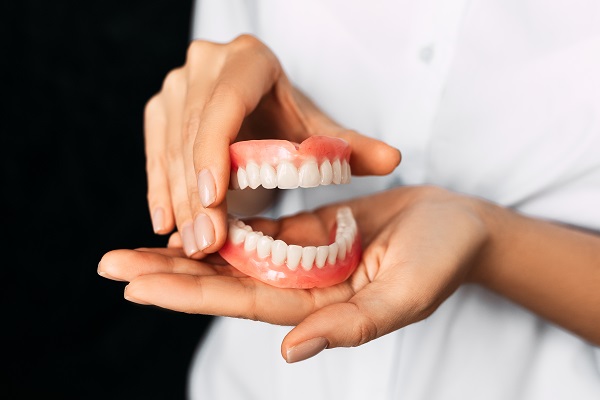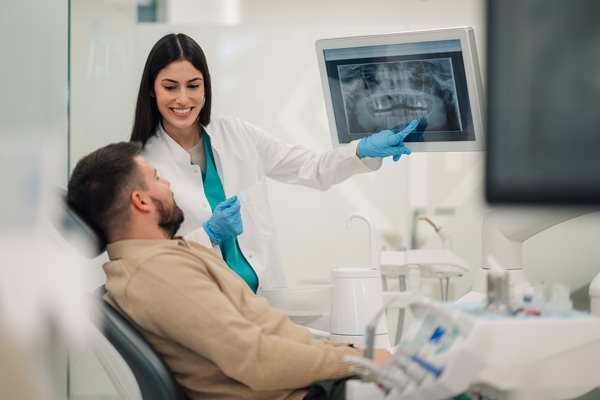3 Tips for Adjusting to New Dentures

Looking for tips for wearing new dentures? There are a few different options when it comes to choosing a dental professional for denture reasons. General dentistry is one of the more common dentistry options people are choosing to get their new dentures, as many general dentists now offer their patients denture services.
New dentures
Getting ready to wear your new dentures? This should be an exciting time, as dentures are a replacement option for those who are missing multiple or all of their teeth. Teeth play a very important role in one’s life, so when someone is in need of teeth replacement, getting dentures is a popular choice. Since wearing new dentures requires a learning curve, learning some tips for wearing new dentures is something every new denture wearer needs to do to ensure a successful adaptation to their new teeth.
How to adapt to life when wearing new dentures
The list below includes three different beneficial tips that new denture wearers can use to help them adjust to their new life wearing dentures.
#1 – Practice talking
Dentures change the way someone talks, making it essential for them to practice talking at home before going out in public. Talking out loud is necessary, as this allows the denture wearer to hear any words they may not be pronouncing correctly. Tips for helping wearers talk properly while wearing their new dentures include reading in front of a mirror, gently biting down and swallowing before talking, singing and using a dental adhesive if necessary to keep the dentures in their proper place.
#2 – Practice eating
New denture wearers can practice eating at home before eating out in public. Since new denture wearers say their new dentures feel strange or even clunky, practicing eating at home is a good idea before going to a café or restaurant. It is necessary to get used to chewing with dentures, eating soft foods in the first week or so is an essential part of learning how to eat wearing new dentures. Chewing evenly on both sides of the mouth and not using one’s front teeth helps keep the dentures in their proper place.
#3 – Exercise the cheeks
The muscles in the cheeks are responsible for the motions of eating and talking. This makes it beneficial to strengthen these muscles, as this will in turn help support the ability to more easily perform both talking and eating abilities when wearing new dentures. These exercises can be performed before getting dentures and require one to make an exaggerated smile for 15 to 20 seconds, four to five times a day.
Need new dentures?
In need of new dentures? When someone wears dentures for the first time, there is a definite adjustment period they need to go through. While it is essential for new denture wearers to follow all of the instructions given to them by their dental professional, the tips above will help when it comes to making everyday life living with dentures as simple as possible.
Are you considering dentures in the Torrance area? Get more information at https://www.yanasedds.com.
Check out what others are saying about our dental services on Yelp: Dentures in Torrance, CA.
Recent Posts
Implant-supported dentures are an excellent choice for patients who want a durable and easy option for replacing lost teeth. This restoration allows patients to enjoy their favorite meals once again and go about their regular activities with the denture securely in place. There is no need to worry about the dentures slipping or coming loose…
Implant supported dentures are a more comfortable option than their conventional counterparts. Attaching dentures to implants leads to remarkable stability while speaking or eating. It provides a solution for missing teeth that feels a lot like having real teeth.Traditional dentures come with an adjustment period as the wearer gets used to eating and speaking with…
Gum disease is not a condition you should ever ignore. At the first signs of trouble, you should talk to your dentist about how to treat these issues and restore your gums to good health. While the dentist can recommend in-office treatment, there are also things you can do on your own. Along with good…
Enhancing the appearance of your smile is an important aspect of dental care, and cosmetic dentistry offers a variety of procedures to improve the aesthetics of teeth. Whether addressing discoloration, misalignment, or missing teeth, cosmetic dentistry provides tailored solutions that combine function and beauty. Understanding the most popular procedures in this field can help patients…


